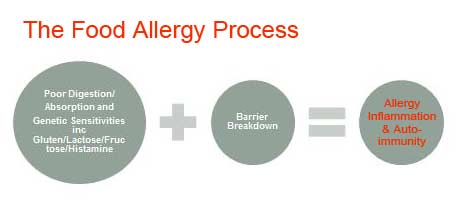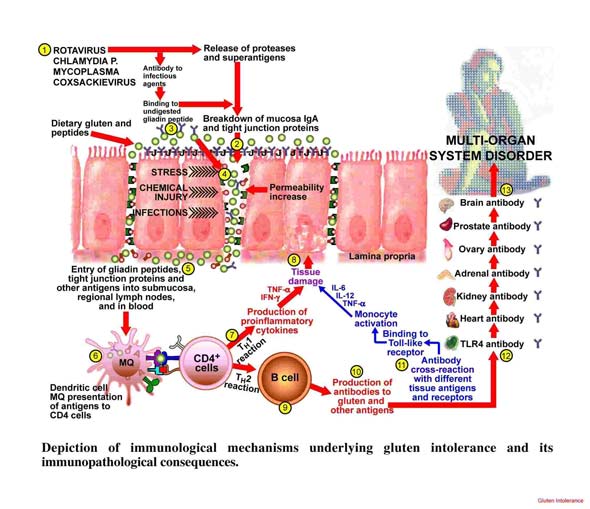|
|
|
Micki Rose is a nutritionist specialising in sensitivity but she is also, as she says, the most sensitive person she has ever treated! This puts her in an ideal position to test out her fascinating theories about the causes of disabling sensitivities such as her own. |
|
Here’s the problem: you’re reacting to more and more things and your diet and lifestyle is becoming more and more restricted. Every time you try to follow the normal recommendations, you feel worse. You start to panic about the future: what are you going to do? First, stop panicking, the stress won’t help! Second, let’s learn how I think it happens and what we can do to stop it. Hyper-Permeability This is a complex issue so I tried hard to boil it down to where it starts rather than get caught in what happens immunity-wise, which, let’s face it, is mind-boggling. Most of the problem, in my opinion, seems to stem from either poor digestion or lack of ability to break elements of food down properly and from the increased permeability of the body barriers starting with, but certainly not limited to, the gut. Once you have become hyper-permeable or, if you like, your barriers are broken, allergens from anything can gain entry into the body where they shouldn’t be. This is most likely to be via the gut first with food, obviously, but once skin, lung and blood-brain barriers are also hyper-permeable, you become sensitive to toiletries (via the skin), pollens and chemicals (inhalation) and onward. Eventually, inflammation and immune processes, especially auto-immunity, can occur anywhere in any organ or tissue, which explains why the symptoms of allergy are so diverse. Here’s a quick summary of the process as I see it: quite simple really when you break it down:
Here is a more complex look from immunologist Prof Vodjani at the process the body goes through when someone has become multiple-sensitive. In this case, he is looking at the way gluten is involved. Gluten is known to increase production of zonulin, a key substance that helps control barrier permeability:
In essence, it shows that we need: 1. An environmental trigger of some kind (eg gluten, dairy, fungus, bacteria, stress, trauma, chemical toxin) plus Barrier Testing First, you want to know this is your problem before you launch into the treatment. In my – and others’ opinion - the very presence of antibodies like IgG, IgA, IgM confirms the barrier problem: no antibodies would be formed if the substances hadn’t got through. Happily, there is also now a Barrier Test that checks to see if candida, bacteria and/or food has breached the barrier. The higher the levels, the more leaky you are. Rather than take up all my space here, I have posted the full test plan for you (see more info below). Barrier Treatment Barrier Breakdown Factors
My case is a severe one. Trust me. It’s a good illustration of how it all fits together, though. I have the gene pattern for gluten sensitivity (not just the DQ2/8 coeliac genes), my sensitivities worsened significantly after a period of family stress which knocked my adrenals down (they were flat as a pancake on testing), my SIgA level dropped with them and I got a chronic mouth infection. I took tons of ibuprofen which just made the gut a whole lot more leaky and off I went with more and more food reactions. So, I sat down and wrote a really detailed treatment plan. The Barrier Diet You need to know what foods might cause or exacerbate hyper-permeability. After all, what's the point in eating foods that are only going to make you develop more food problems later on? The diet plan I settled on is roughly based around the Primal diet (foods we evolved on and can cope with), the Specific Carbohydrate Diet (no complex starches to feed candida or bacteria to allow the gut to heal) and my own TrulyGlutenFree grain and dairy free diet (since all grains contain gluten and gluten is the single biggest cause of barrier hyper-permeability because of its effect on zonulin). It contains no dairy as I find most people with multiple sensitivity cannot tolerate it either – this despite all the dairy-based supplements of whey and colostrum being touted for the leakiness… It is also low in specific lectins, saponins and foods like alcohol and chilli, all known to have an effect on barrier integrity. Most experts believe that re-establishing barrier strength can take anywhere from 6 months to 2 years, and even more in severe cases. Oh heck. I needed a way to speed things up and came up with a grain and dairy free supplement protocol. Believe me: that was the toughest bit as there are hardly any that fit such strict criteria, despite what many manufacturers will tell you. Check my article for FM: Grain and Corn Free Supplements: A Nightmare for more on this. The Barrier Protocol The Barrier Protocol is a fully-researched, product-specific grain, corn and dairy free supplement programme designed to encourage the healing process. In essence, you need to replace the baby bowel flora if necessary and rebuild the flora layer to a protective thickness, bring the inflammation down, feed and repair the linings, encourage absorption, improve SIgA, calm the hyperactive immune system and remove any attacks on the barriers like candida, bacteria, food allergens. Quite a tall order, but it can be done. Multiple food intolerance does not build overnight, nor does it get better overnight. Generally, people feel better symptomatically within weeks, days sometimes, but I normally recommend initial re-testing of the barrier or foods after about 3-6 months depending on the case. How Have I Got On? The full Barrier Plan complete with diet and supplement protocol costs £65 and is available from the Pure Health Clinic Shop here, along with a raft of further reading and supporting documents. Micki no longer sees individual patients but embarking on the barrier plan gives you entry to an extremely busy interactive community of fellow sufferers, monitored by Micki, through her Truly Gluten Free site. Any problems you may have will be swiftly addressed either by Micki herself or by one of your fellow Barrier Plan followers. If you want to do some further reading before committing yourself to the plan, there is a huge amount of information available on the Truly Gluten Free site (follow the links from the black horizontal bar on the site) and/or you can download Micki's free 30 page Multiple Food Intolerance factsheet here. First published in June 2012 • If this article was of interest you will find many other articles on unlikely allergies and allergy connections here – and links to many relevant research studies here. |














